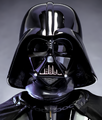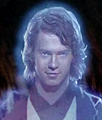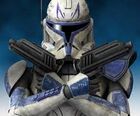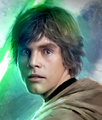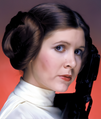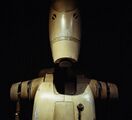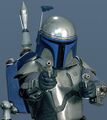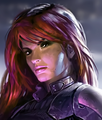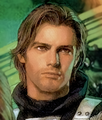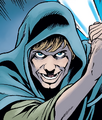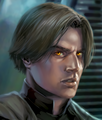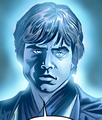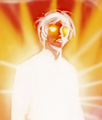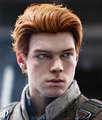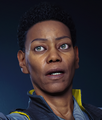The Original Star Wars Canon strictly goes by the feats within the Hexalogy (Episode I-VI) and the Star Wars The Clone Wars 3D TV Show. Jedi in this while still notably strong, are more grounded and weaker then most of their other canon counterparts. Though they still can produce incredible feats such as Obi Wan being able to pry open superhuman cyborgs like General Grevious' armor, along with this the Jedi have showcased being able to move at superhuman speeds, to where they appear as a blur. Along with this is a showcase of abilities that force sensitive users possess from The Force, some of which include Mind Manipulation, Telekinesis, Statistics Boost, Cosmic Awareness.
The official discord link if you wish to join the discord: https://discord.gg/j5RKwCvAFu
Support the wiki on our official Ko-Fi page or Patreon page!
Star Wars: Difference between revisions
m |
|||
| Line 239: | Line 239: | ||
[[Category:Movies]] | [[Category:Movies]] | ||
[[Category:Anime]] | [[Category:Anime]] | ||
[[Category: | [[Category:Book Series]] | ||
[[Category:Graphic Novels]] | [[Category:Graphic Novels]] | ||
[[Category:Games]] | [[Category:Games]] | ||
Latest revision as of 20:49, 30 September 2024
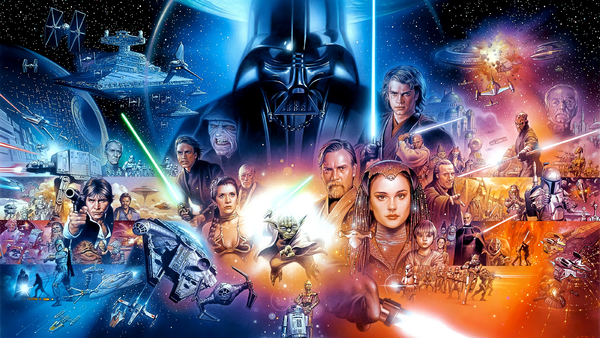
Some of the information indexed are thanks in part to the Wookieepedia, the Star Wars Wiki.
Background
Star Wars is an American epic space-opera media franchise created by George Lucas, which began with the eponymous 1977 film and quickly became a worldwide pop-culture phenomenon. The franchise has been expanded into various films and other media, including television series, video games, novels, comic books, theme park attractions, and themed areas, comprising an all-encompassing fictional universe. The franchise holds a Guinness World Records title for the "Most successful film merchandising franchise".
The original film, retroactively subtitled Episode IV: A New Hope, was followed by the sequels Episode V: The Empire Strikes Back (1980) and Episode VI: Return of the Jedi (1983), forming the original Star Wars trilogy. A prequel trilogy was later released, consisting of Episode I: The Phantom Menace (1999), Episode II: Attack of the Clones (2002), and Episode III: Revenge of the Sith (2005).
Star Wars Legends, formerly known as the Expanded Universe (abbreviated EU), encompasses every one of the licensed, fictional background stories of the Star Wars universe, outside of the original six Star Wars films produced by George Lucas and certain other material such as Star Wars: The Clone Wars, created before April 25, 2014. It is derived from and includes most official Star Wars books, comic books, video games, spin-off films, television series, toys, and other media created before that date. This material expands and continues the stories told in the films, taking place anywhere from over 36,000 years before The Phantom Menace to 136 years after Return of the Jedi. The issue of which aspects are canon was one of the most hotly debated topics among fans.
On April 25, 2014, Lucasfilm Ltd. announced that in preparation for the upcoming sequel trilogy, the Expanded Universe would be retconned; past tales of the Expanded Universe will be printed under the Star Wars Legends banner, and a new continuity has been established that consists only of the original six films, the Star Wars: The Clone Wars television series and film, and all future material from that point onward. Though past elements of the Expanded Universe have been declared non-canon as a whole, they remain a resource for future Star Wars material to reference, thus bringing these elements into the new continuity as canon. Today, the only Legends product that is still being released is the video game Star Wars: The Old Republic, along with short stories published at the Star Wars blog.
The Expanded Universe had a continuity with a few wrinkles. The general rule was that nothing in the Expanded Universe was allowed to contradict any other part of the Expanded Universe or the films. The films, however, do slightly contradict the Expanded Universe on occasion, and retcons were created in the Expanded Universe to fix these contradictions. In the absence of such ad hoc solutions, the EU is considered incorrect only on the particular points of contradiction.
The Expanded Universe is actually older than the films themselves, as the novelization of the original film was published six months before the film was released. In in-universe chronology, the earliest works are the Dawn of the Jedi comics, which are set millennia before the films, while the latest are the Legacy comics, which are set about one hundred and thirty years after Return of the Jedi.
The Expanded Universe was intended to be a continuation, and an expansion, on the six Star Wars theatrical films produced by George Lucas from 1977 to 2005. All EU material, combined with that presented in the films, was meant to function as a complete story. However, in order to allow this story to function as a whole, it was kept in an order of continuity. Lucasfilm held this of such high importance that a team's sole job at Lucasfilm was maintaining continuity between Lucas's films and the EU, which was created by many other authors and artists, many times out of order, and with many different ideas. Though it eventually was erased from main in 2012, when Disney acquired the rights to the Star Wars franchise; and as such split the continuities in twine.
The subsequently-produced sequel trilogy consists of Episode VII: The Force Awakens (2015), Episode VIII: The Last Jedi (2017), and Episode IX: The Rise of Skywalker (2019). Together, the three trilogies form what has been referred to as the "Skywalker saga". All nine films were nominated for Academy Awards (with wins going to the first two released) and were commercially successful. Together with the theatrical spin-off films Rogue One (2016) and Solo: A Star Wars Story (2018), the combined box office revenue of the films equates to over US$10 billion, and it is currently the second-highest-grossing film franchise.
Chronologically, the story begins with Anakin Skywalker, the Chosen One of Jedi prophecy, as the prequel trilogy charts his rise as a Jedi Knight through his fall to the dark side of the Force and becoming Darth Vader. The original trilogy tells the story of Anakin's children, Luke Skywalker and Leia Organa, as they lead the fight against the Galactic Empire and as Luke saves Anakin from the dark side and becomes a Jedi in his own right. The sequel trilogy focuses on Rey, a Force prodigy of unknown lineage who is swept up into a new galactic conflict and faces off against Anakin's fallen grandson, Kylo Ren, while becoming the first of a new generation of Jedi. </tabber>
Power of the Verse
As the name implies, this canon expands upon the already given explanations of the original star wars universe, with characters such as Palpatine having techniques in this continuity known as "Force Storm" which allows him to consume an entire planet and other Sith Lords having the ability to pull the core from a star to make it supernova.
As this canon essentially makes it where the expanded universe events are mere legends people tell with only some of them being true or not, they do not have some of the abilities and feats that originate from it, however they have their own added abilities along with new lore that adds new feats for them that did not exist in the expanded universe.
Canon
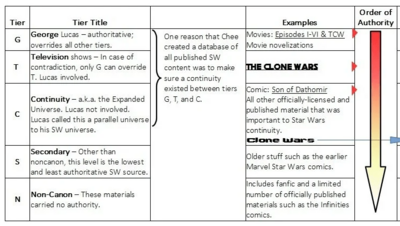
Disney Pillar
- D-Canon: Disney canon. This is all material created after Disney's acquisition of Lucasfilm and the Star Wars brand in 2012, where the company stripped all other material from their canon and built things from the ground-up. This contains all material made after 2012, such as the Star Wars: Episode VII - IX, the Star Wars Story films, the newer Star Wars video games, as well as some television shows like Kenobi, The Mandalorian, and The Book of Boba Fett.
The Disney Pillar falls outside of the other forms of canon tiers within Star Wars as they created their own canon and removed the canon tiers, referring to anything not deemed to them as canon as "Legends".
The canon prior to Disney's acquisition was split into 5 separate levels, though some of the levels are combined together to form their own canon universe. The Original Star Wars Universe
- G-Canon: George Lucas canon. This is the canon of the series that overrides all other tiers of canon, with the exception of Orwellian retcons such as Han Shot First, it cannot be contradicted or retconned by any other form of canon. The media featured in G-Canon would be the original six films, Star Wars: Episode I - Episode VI, as well as their novelizations.
- T-Canon: Television show canon. This is the canon of the series second only to G-Canon, which can only be overridden by it. George Lucas is directly involved in this tier of canon, and thus it is most closely tied to his original works. This includes only the television show, The Clone Wars (2008)
G-Canon and T-Canon are consistently noted in interviews and by George Lucas himself to be both of the canons he envisions as the canon form of Star Wars:
- "T-canon in its entirety is not supposed to be considered part of the EU pillar, but part of the Lucas pillar."[1]
- "The clarify this point just a little bit further, The Clone Wars will not be considered Expanded Universe. They'll be ranked up there with The Movies."[2]
- "The three pillars that George Lucas refers to has a first pillar that is the part of the Star Wars universe that George follows and has direct control over, namely the movies and the television series. The second pillar includes the portions of the Star Wars universe created by Lucas Licensing that includes the videogames, books, and toys that George exhibits less direct control over. Both the first and second pillars are treated as official Star Wars continuity. The third pillar is anything generated by the fans, referred to by some as fanon (short for fan canon)."[3]
- "I am the father of our Star Wars movie world - the filmed entertainment, the features and now the animated film and television series. And I'm going to do a live-action television series. Those are all things am very involved in. I set them up and I train the people and I go through them all. I am the father that's my work. Then we have the licensing group, which does the games, toys and books and all that other stuff. I call that the son - and the son does pretty much what he wants. Once in a while, they ask a question like "Can we kill off Yoda?" Things like that but it's very loose. Then we have the third group, the holy ghost, which is the bloggers and fans. They have created their own world. I worry about the father's world. The son and the holy ghost can go their own way.[4]
- Interviewer: "Do you consider "The Clone Wars" canon or part of the Expanded Universe? Is the old Cartoon Network show canon? How do the two relate and where do the two series fit in the Star Wars Universe?"
- Filoni: "That's one of the biggest debates in Star Wars, what counts? The idea of what is canon? When I talk to George I know that he considers his movies, this series and his live-action series canon. And yet as a fan, I bring him a lot of information that is in the Expanded Universe and say, well this was done and this was done too. I get that information in front of him to see how he wants to use it or review it. I'll try to add little touches and things that I know that the fans that are well versed in the Expanded Universe will know; what we can work in from the Expanded Universe really does gel. But there's never an implicit connection between the micro-series that Cartoon Network did previously and the series that we're doing now. I personally as a fan never think of it as discrediting any of the other material, it's just that other material is from a different point of view, a different look at the war and take on the war. It's an ever-Expanding Universe in a lot of ways."[5]
- "We could come up with ideas and present them to him immediately, so there was no concern as to whether or not it "was" Star Wars. This series at least to George is NOT EU, it is a part of Star Wars as he sees it. I think if anything there was a period where Henry and I had to learn exactly what it took to be a part of George Lucas' Star Wars, and tell the Star Wars story his way. We had to learn how to look at the Galaxy from his point of view and let go of some of what we considered canon after we found out the ideas were only EU. Really we had to "unlearn what we had learned" and go back to the movies as the defining source material."[6]
- "I haven't limited myself with what stories I've wanted to tell; this is Star Wars, and I don't make a distinction between the series and the films. It's just a different format and a different delivery. But the fact of the matter is that our improved processes for the stories have allowed us to tell consistently bigger stories. Our teams are constantly pushing the envelope, so that the standard keeps raising itself higher and higher. And we keep asking for more than can be delivered, so we're always reaching and the show is always improving. Each week is a Star Wars feature, boiled down to 22 minutes."[7]
- "G' canon and 'T' canon comprise George Lucas's vision of the Star Wars universe. 'C' canon and 'S' canon comprise the vision of the Star Wars universe held by Lucas Licensing that goes beyond George Lucas's vision. This material is collectively referred to as the Expanded Universe."[8]
- "Common questions are: How "real" are these stories? Do they count? Did they really happen?"
- "The most definitive canon of the Star Wars universe is encompassed by the feature films and television productions in which George Lucas is directly involved. The movies and the Clone Wars television series are what he and his handpicked writers reference when adding cinematic adventures to the Star Wars oeuvre."
- "But Lucas allows for an Expanded Universe that exist parallel to the one he directly oversees. In many cases, the stewards of the Expanded Universe—editors within the licensing division of Lucasfilm Ltd. who works with authors and publishers—will ask for his input or blessing on projects. Though these stories may get his stamp of approval, they don't enter his canon unless they are depicted cinematically in one of his projects."[9]
The Expanded Star Wars Universe
- C-Canon: Continuity canon, or Extended Universe (Legends) canon. This is the canon of the series below the projects worked on by George Lucas, and has thus been stated by him to have taken place in an alternate, parallel universe. This covers all content written as continuations of the original story without Lucas involved, such as Dark Empire, the Thrawn Trilogy, and some video games, such as The Force Unleashed. It also notably includes the television shorts, Clone Wars (2003)
- S-Canon: Secondary canon. This canon is, aside from the non-canon material, the least authoritative pieces of material that cannot override or retcon anything above it. This includes much of the older non-Lucas content, such as the Marvel Star Wars comics.
The C-Canon and S-Canon are merged together to form the "Second pillar" in many cases, officially being referred to as the "Expanded Universe", later being called "Legends" by the Disney Canon:
- "G' canon and 'T' canon comprise George Lucas's vision of the Star Wars universe. 'C' canon and 'S' canon comprise the vision of the Star Wars universe held by Lucas Licensing that goes beyond George Lucas's vision. This material is collectively referred to as the Expanded Universe."[10]
Fanon Pillar
- N-Canon: Non-Canon. This is all material that holds no authority in the series whatsoever, usually being spin-offs, adaptations, or what-if series. This content contains a wide variety of material, from the LEGO games, to toys, to what-if endings in video games, to the Infinities comics. It also is said to include fanfiction, which shows how low of a canon this is.
- P-Canon: Prototype canon. These are stories from early draft, conceptualized or unpublished versions of Star Wars, that is made by the employers with its IP, with George Lucas's early drafts for Star Wars Episode IV: A New Hope being prime examples of this named as The Star Wars. These also include early concepts of stories for comics, novels and games during the writing process. It should be noted that this canon isn't singular, due to having multiple stories that exist as its own prototype for the official story to be established.
Both of these are the purely fanon pillars, neither are a singular "canon" universe but rather myriads of different continuities that don't connect.
Terms
- The Force: The Force, early known as the Power of Cosmos by the Kwa, was a metaphysical, spiritual, binding, and ubiquitous power that held enormous importance for both the Jedi and Sith monastic orders. Known as the Way in ancient times, the Force was viewed in many different aspects, including, but not limited to, the Light side of the Force, the Dark side of the Force, the Living Force, the Unifying Force, the Cosmic Force and the Physical Force. The first two aspects were concerned with the moral compass of the Force, as manifested by the conduct and emotions of living creatures who were themselves part of the fabric of the Force. The light side of the Force was the facet aligned with compassion, selflessness, self-knowledge and enlightenment, healing, mercy and benevolence, while the dark side of the Force was the element aligned with hatred, fear, covetousness, anger, aggression, jealousy and malevolence. The latter four aspects were defined by prominent Jedi philosophies: The Living Force dealt with the energy of living things; the Unifying Force, with the entirety of space and time; the Cosmic Force, with life after death; and the Physical Force, with anything within one's surroundings. Though the Force was categorized in this way, there were no specific abilities or powers that were only usable by a follower of a particular path of the Force; the Force partially existed inside the life forms that used it, and drew energy from their emotions. Some beings, particularly the Sith, believed that the dark side of the Force was more powerful than the light, though it was possible that the dark side was just more tempting to those who used it (or desired to use it). Others thought of the Force as an entity capable of intelligent thought, almost as a sort of deity. Anakin Skywalker, who was believed to have been conceived by the Force itself, may have shared this belief; if this was indeed the case, it would add credence towards the view of the Force as a sentient entity. Though the Force was thought to flow through every living thing, its power could only be harnessed by beings described as "Force-sensitive." This Force-sensitivity was correlated with, and sometimes attributed to, a high count of internal microorganisms called midi-chlorians that were found in a Force-sensitive's blood: the higher the count, the greater the being's potential Force ability, though there were some exceptions to this rule. Force-sensitive beings were able to tap into the Force to perform acts of great skill and agility as well as control and shape the world around them. Sometimes this ability was described as having a strong Force "aura".
- The Four Aspects of the Force:
- The Living Force: The Living Force was a view on the Force, accepted by the minority of Jedi throughout ages, the Living Force was thought to be present in most living beings, surrounding and penetrating them, thus making all living things connected by it. The Jedi believed the Living Force relied on their instincts and were attuned to other living beings around them, they were mindful of the future and the possible consequences of their actions, but remained focused on the present. The Living Force was viewed as having both the light and the dark side, the Jedi always had to be mindful of their actions to avoid the temptations of the dark side. Through following the Living Force, several Jedi were able to retain their identities after their physical death, becoming one with the Force and able to manifest themselves as Force ghosts. Proponents of the Living Force view, such as Qui-Gon Jinn, espoused a philosophy of "living in the moment", relied heavily on their instincts and concentrated more on sensitivity to living things, rather than fulfilling destiny, which was one of the main tenets of the Unifying Force philosophy.
- Unifying Force: The Unifying Force was a view of the Force, accepted by a minority of Jedi throughout ages, the Unifying Force was thought to be present in all shining stars, surrounding and penetrating them, thus making all universal things connected by it. The Jedi believed the Unifying Force relied on their understanding and were attuned to space around them. The Unifying Force was believed as having neither the light nor the dark side. The light and dark sides are instead conceptualized in a metaphorical way, treating all beings equally. Followers of the Unifying Force always kept their eyes open for future possibilities. In the end, it resulted in them trying to fulfill a destiny rather than focusing on here and now, which was one of the main tenets of the Living Force philosophy. Visions of the future were of particular significance to Unifying Force supporters. Yoda was one of the most adamant proponents of heeding visions of the future, though he did not adhere to many of the other views common with the Unifying Force. Many of these Jedi believed a similar philosophy focusing on the flow of time as a whole, ignoring primary use of the Living Force. Voices for the latter espoused a philosophy of "live for the moment" and heavily relied on their instincts. This viewpoint might have allowed the Jedi Order to stave off the conflict that gave rise to the Galactic Empire, as its members lost themselves in looking forward rather than analyzing the unfolding events before them. Yoda later espoused beliefs closer to the philosophy of the Living Force when training Luke Skywalker on Dagobah. Ironically, Emperor Palpatine, known as Darth Sidious, also supported this belief in the Unifying Force. He agreed that there was only one Force: the only difference worthy of note was that the Sith saw the Force as a means to an end while the Jedi saw it as an end in itself. This view was also supported by Vergere, who taught Jacen Solo that there was no light side or dark side of the Force—only the Unifying Force. Vergere also told Solo that "the Force was everything, and everything was the Force;" that the Force did not have sides and never took sides. However, the Sith Lord Darth Plagueis disagreed with this belief. His own studies of the Force had indicated to him that there was a clear and obvious distinction between the light and dark sides. Lord Kaan used the term "twilight" to describe an idea that the Force was not split into light and dark sides during a portion of the Ruusan campaign.
- Cosmic Force: The Cosmic Force, also known as the greater Force, was an aspect of the Force, described by the wisest of Jedi Masters as a "unifying gestalt". Through the Living Force, it made possible the phenomenon of Force ghosts.
- Physical Force: The Physical Force was a facet of the Force that allowed Force-sensitives to manipulate the objects in their surroundings. The Physical Force was similar to the Living Force and Unifying Force, as well as how Jedi were connected to other living beings surrounding them, and throughout the galaxy.
- The Four Aspects of the Force:
Knowledgeable Members
Characters
Jedi Order
-
Anakin Skywalker
-
Obi-Wan Kenobi
-
Mace Windu
-
Kit Fisto
Sith Order
-
Darth Vader
Force Entities
-
Force Ghost Anakin
-
The Daughter of Mortis
-
The Son of Mortis
Galactic Republic
-
Padmé Amidala
Clones
-
Captain Rex
The Rebellion
-
Luke Skywalker
-
Leia Organa Solo
Trade Federation of Planets
Droids
-
B1 Battle Droids
Bounty Hunters
-
Jango Fett
-
Boba Fett
Jedi Order
-
Anakin Skywalker
-
Obi-Wan Kenobi
-
Mace Windu
-
Kit Fisto
-
Luke Skywalker
-
Leia Organa Solo
-
Mara Jade Skywalker
-
Jacen Solo
Dark Jedi
-
Luuke Skywalker
Sith Order
-
Darth Vader
-
Darth Caedus
Force Entities
-
Force Ghost Luke
-
Force Ghost Anakin
-
Force Oneness Jacen
-
The Daughter of Mortis
-
The Son of Mortis
Galactic Republic
-
Padmé Amidala
Clones
-
Captain Rex
Trade Federation of Planets
Droids
-
B1 Battle Droids
Bounty Hunters
-
Jango Fett
-
Boba Fett
Republic Era Jedi Order
-
Cal Kestis
-
Cere Junda
Force Entities
-
The Daughter of Mortis
-
The Son of Mortis
Rebel Alliance
-
Rey Palpatine
Trade Federation
Droids
-
B1 Battle Droids
Other
-
Padmé Amidala
References
- ↑ https://web.archive.org/web/20080918123922/http://forums.starwars.com/thread.jspa?threadID=152583&start=1838#17244593
- ↑ https://web.archive.org/web/20080918123922/http://forums.starwars.com/thread.jspa?threadID=152583&start=1838#17243049
- ↑ Star Wars Insider 104
- ↑ George Lucas' statement regarding canon in Star Wars Insider 104
- ↑ Director talks Star Wars: The Clone Wars, 2008-10-07, Comic Book Resources
- ↑ Interviews - Face To Face With The Masters 2008-12-29
- ↑ George Lucas and Dave Filoni talk Star Wars: The Clone Wars, James Hoare, 2014-10-11, SciFiNow
- ↑ [https://web.archive.org/web/20110520035911/https://blogs.starwars.com/holocron/4 "What is Holocron?"
- ↑ Star Wars: The Essential Reader's Companion
- ↑ [https://web.archive.org/web/20110520035911/https://blogs.starwars.com/holocron/4 "What is Holocron?"




